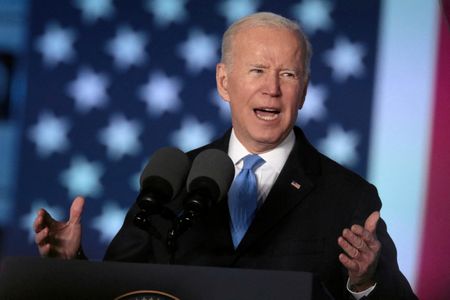 1
1 1
1

By David Lawder
WASHINGTON (Reuters) -The U.S. Treasury on Monday proposed a new mechanism to comply with and enforce a 15% global corporate minimum tax agreed to last year by 136 countries, partly by denying deductions for taxes paid in jurisdictions with lower rates.
The new Undertaxed Profits Rule proposed as part of President Joe Biden’s fiscal 2023 budget plan would replace the current U.S. Base Erosion Anti-Abuse Tax (BEAT) with a new system that would act as a “top-up tax” to ensure that multinational corporations pay an effective tax rate of at least 15%, the Treasury said in budget documents released on Monday.
The global minimum tax deal negotiated through the Organization for Economic Cooperation and Development (OECD) is aimed at ending a downward competitive spiral of corporate rates and an erosion of government revenues while denying advantages to tax-haven countries.
A key feature of Treasury’s proposed rule is that it would generate additional revenue by denying deductions to companies to the extent that they are paying a tax rate below 15%, a U.S. Treasury official told Reuters.
The new plan conforms to so-called “model rules” for the global minimum tax agreed to last December. The countries in the global tax deal have agreed to bring their laws into compliance with the 15% global minimum tax during 2022, with it becoming effective in 2023.
The official said Treasury was ready to work with Congress on enabling legislation to ensure that U.S. tax credits and other incentives for American corporations are preserved.
The Treasury said in its revenue proposals that the undertaxed profits rule would apply to entities with more than $850 million in global annual revenue in at least two of the last four years.
It said the current BEAT tax — a kind of alternative minimum tax — puts manufacturing firms at a disadvantage to services firms, and the new proposal would more comprehensively address costs of goods sold.
(Reporting by David Lawder; editing by Jonathan Oatis and Mark Porter)